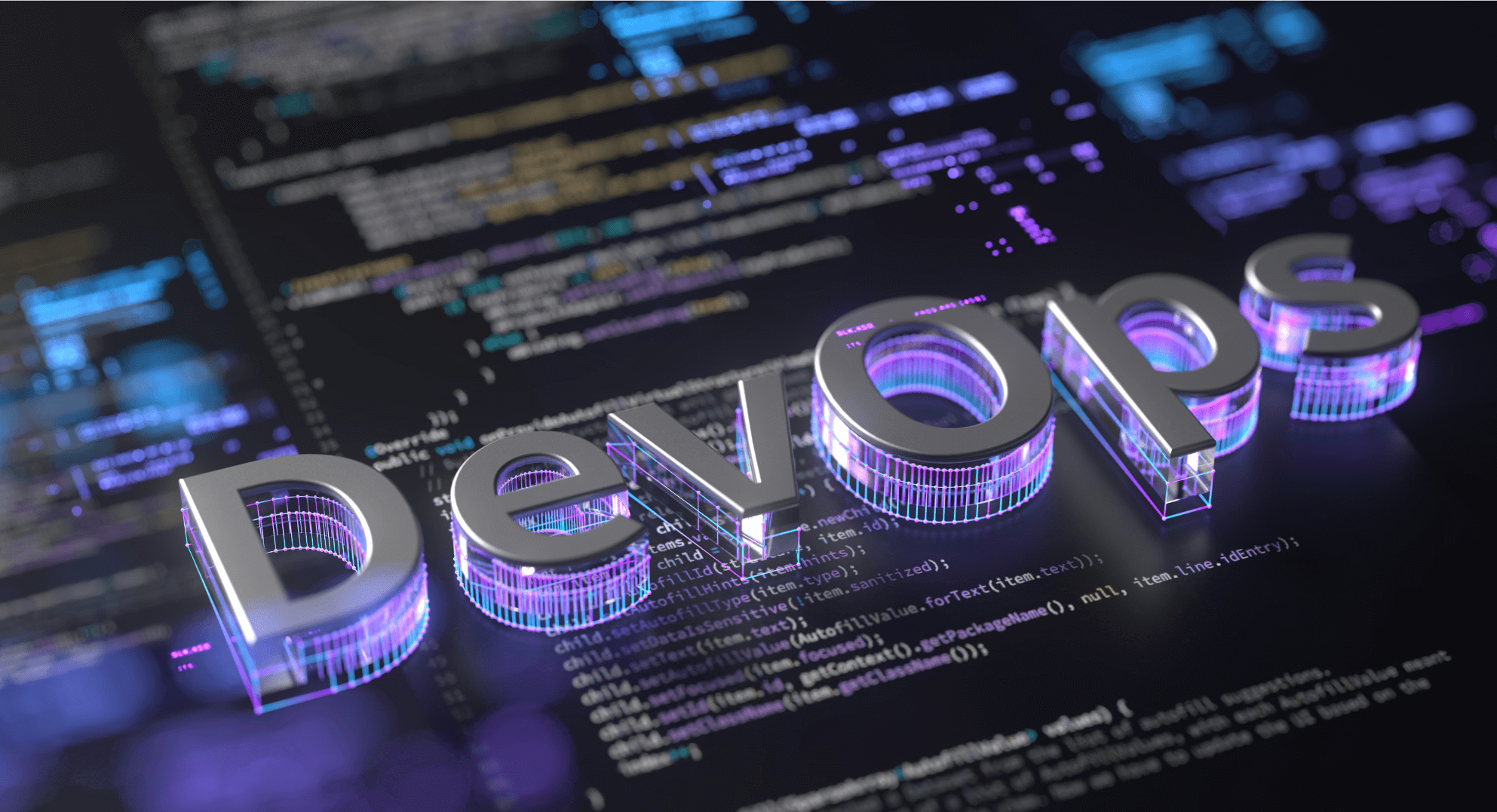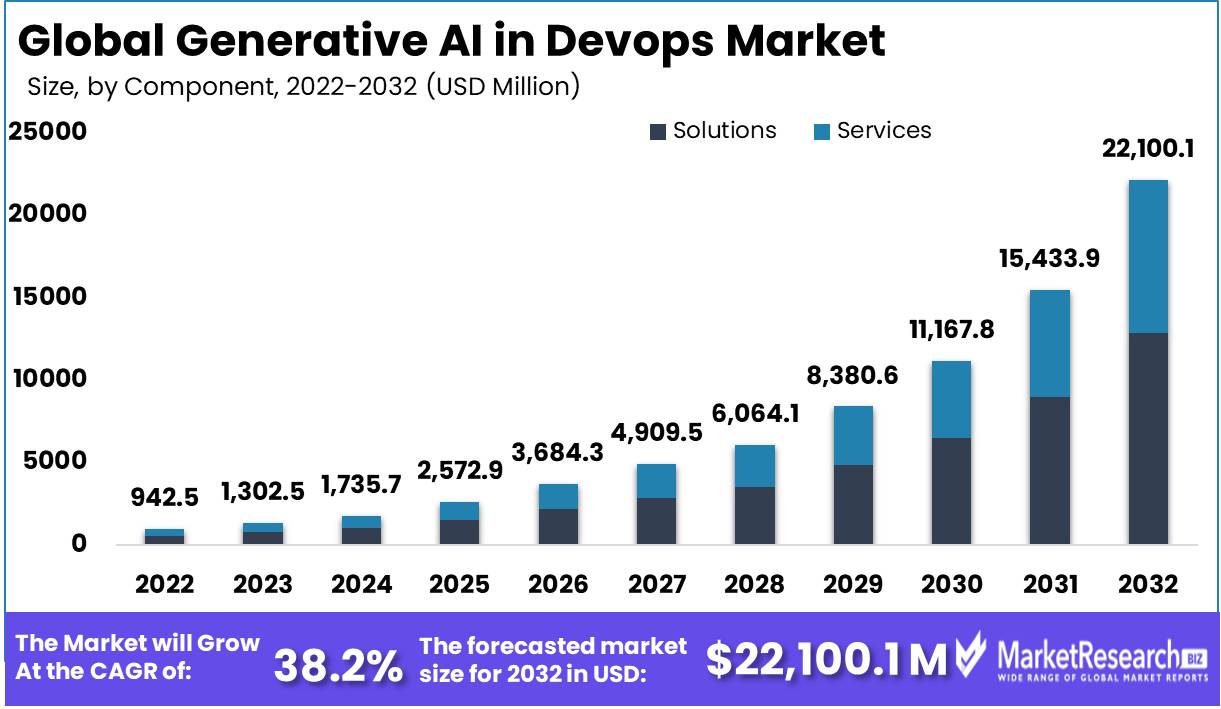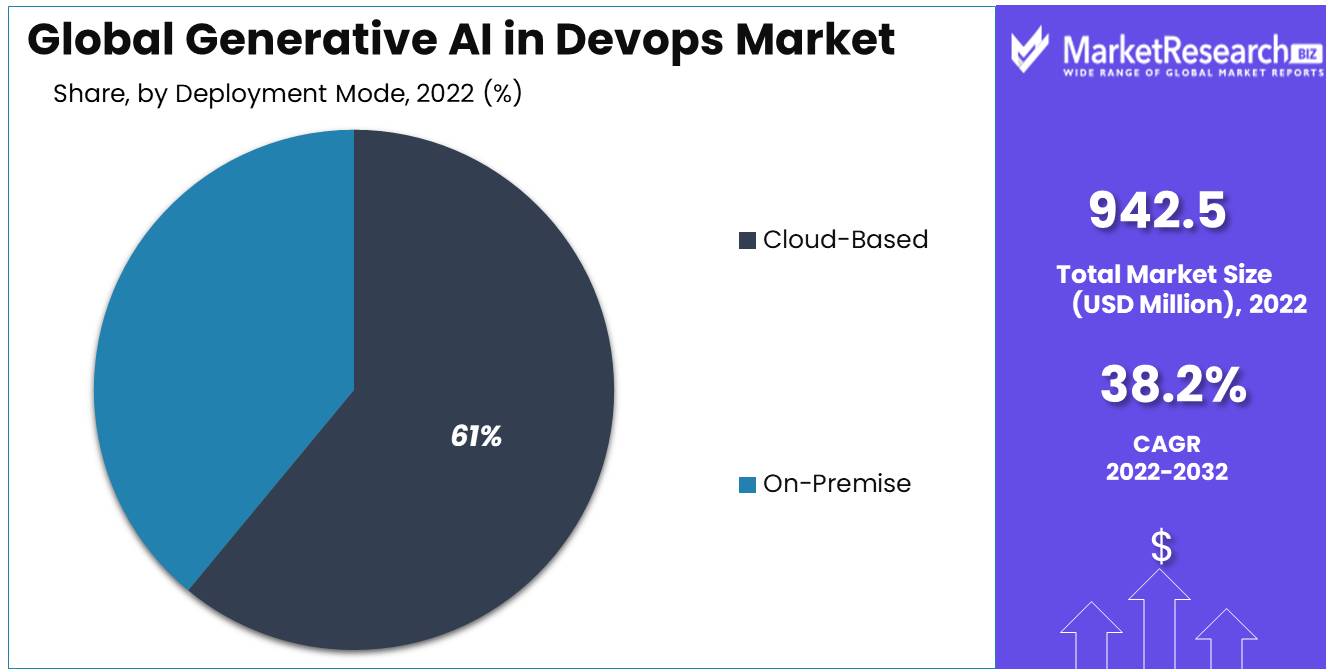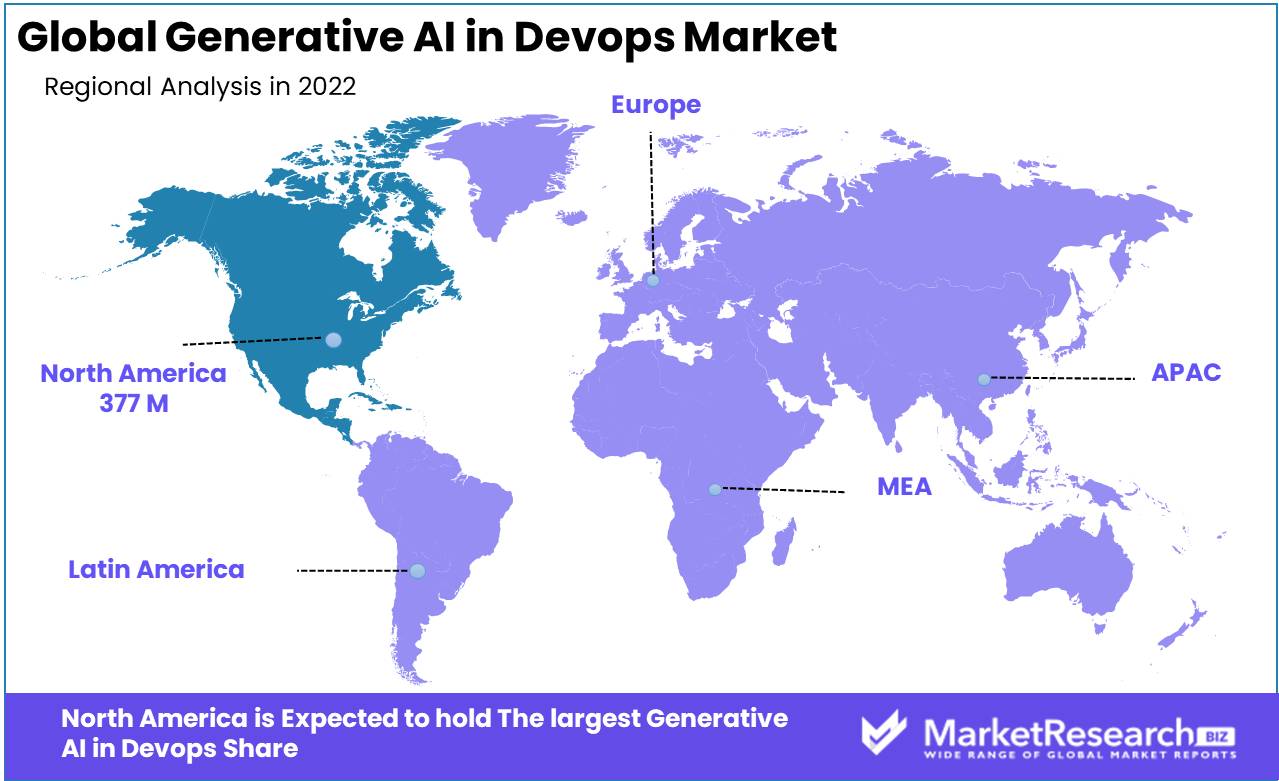
Global Generative AI in DevOps Market By Component (Solutions, and Services), By Deployment Mode (On-premise, and Cloud-based), By Application (Testing, Deployment, and Other ), By Region and Companies - Industry Segment Outlook, Market Assessment, Competition Scenario, Trends, and Forecast 2023-2032
-
37107
-
July 2023
-
155
-
-
This report was compiled by Correspondence Linkedin | Detailed Market research Methodology Our methodology involves a mix of primary research, including interviews with leading mental health experts, and secondary research from reputable medical journals and databases. View Detailed Methodology Page
-
Report Overview
Global Generative AI in DevOps Market size is expected to be worth around USD 22,100 Mn by 2032 from USD 942.5 Mn in 2022, growing at a CAGR of 38.20% during the forecast period from 2023 to 2032.
Generative AI is a machine learning model which creates new content, such as images, code, or text on the basis of examples it has learned. On the other side, DevOps is a methodology that places an emphasis on cooperation & communication between IT specialists with software developers to provide software fast and consistently. DevOps and generative AI can work together to automate some jobs in the software development process, increasing productivity and efficiency. The generative AI in DevOps market is anticipated to increase significantly as a result of the increasing adoption of cloud computing and the rising demand for automation in the software development process. However, challenges such as the lack of skilled personnel and the potential for bias in generative AI models could hinder market growth.

Driving Factors
One of the main drivers is the increasing popularity of cloud computing. It gives businesses access to powerful computer resources whenever they need them. It also increases the scalability and flexibility of the software development process. The need for automation & efficiency in software development is growing as more businesses migrate to the cloud, also generative AI is viewed as a critical tool for attaining these objectives.
The rising demand for DevOps approaches, which emphasize cooperation and communication between software developers and IT experts, is another motivating reason. DevOps is gaining popularity as a means of accelerating the software development lifecycle and enhancing software product quality. In the DevOps process, processes like code generation and testing may be automated with the use of generative AI, making it a useful tool for DevOps teams.
The development of machine learning techniques and the growing accessibility of massive datasets are further factors driving the market for generative AI in DevOps. Machine learning algorithms are a useful tool for software development since they may produce more complicated and realistic material as they advance in sophistication. Additionally, machine learning models may be trained on bigger and more varied datasets as more data becomes accessible, improving accuracy and performance.
Restraining Factors
The lack of qualified employees who can create and implement generative AI solutions is one of the main issues. As generative AI is a new subject there aren't many experts who can effectively manage, design, and implement AI systems.
The possibility of bias in generative AI models is another potential restraint. When generative AI models are trained on biased datasets, the resulting models run the risk of amplifying and perpetuating the bias. This might raise moral and legal concerns and limit the applicability of generative AI solutions in some fields.
The integration of generative AI into current software development procedures is another difficulty. High levels of automation, continuous integration, and delivery are prerequisites for DevOps approaches, and incorporating generative AI into these workflows may necessitate considerable modifications to current systems and procedures.
Last but not least, generative AI in DevOps may raise security issues. Generative AI may offer new vulnerabilities and attack vectors that need to be addressed as it is utilized to automate some processes in the software development process.
COVID-19 Impact Analysis
The COVID-19 Pandemic has had an impact on the global economy. This includes the generative AI in DevOps market. The pandemic caused disruptions in the global supply chain, reduced demand for some products and services, and forced many companies into remote operations. The impact of the pandemic has been mixed on the generative AI market in DevOps, with both positives and negatives.
Positively, the pandemic accelerated the adoption and use of cloud computing, DevOps, and other DevOps methodologies. These are the key drivers for the generative AI market in DevOps. Cloud-based solutions are more important than ever as more companies operate remotely. The pandemic also highlighted the importance of efficiency and agility in software development. This has increased the demand to automate DevOps.
The pandemic also has negative effects on the DevOps market for generative AI. The economic downturn brought on by the pandemic led to budget cuts, and reduced investment for certain areas. This includes new technologies such as generative AI. The pandemic has also exacerbated the shortage of skilled personnel working in the field of generative AI, as many professionals were forced to leave their job or work remotely.
Despite these challenges, the generative AI in DevOps market is expected to grow in the post-pandemic era. As more companies adopt cloud-based computing and DevOps, the demand for automation in software development will likely increase, creating opportunities for generative AI. The pandemic also highlighted the importance of digitalization and new technologies for ensuring business continuity. This is likely to lead to an increase in investment in generative AI as well as other emerging technologies.
By Component Analysis
Based on components, the generative AI in DevOps market is segmented into solutions, and services. Among that solutions, the component is dominant in the market with a market share of 58%. Software platforms and solutions that use generative AI to automate various processes in the software development process are included in the solutions sector. Tools for code development, test data generation, and model training are just a few examples of these solutions.
The generative AI in DevOps market is anticipated to be dominated by the solutions sector, thanks to the growing popularity of cloud computing and DevOps practices. The consulting, integration, and support services pertaining to generative AI products in the DevOps industry are included in the services sector. Providing clients with guidance on the optimal methods for adopting generative AI solutions, integrating generative AI solutions with current processes, and providing ongoing support and maintenance for generative AI solutions are a few examples of the services that may fall under this category.
By Deployment Mode Analysis
Based on deployment mode the generative AI in DevOps market is segmented into on-premise and cloud-based. From that deployment mode, the cloud-based segment is dominant in the market with a market share of 61%. Microsoft Azure, Google Cloud, or AWS are some third-party providers whose cloud infrastructure is maintained by third parties and is known as "cloud-based deployment."
Due to it enabling companies to scale their operations effectively and fast without the need for sizable upfront expenditures in IT infrastructure, cloud-based deployment is growing in popularity in the DevOps industry. On-premise deployment means software installation on the firm's own servers. These servers are controlled and maintained by the IT department. Larger businesses that demand tighter control over their software and data frequently employ on-premise implementation.
By Application Analysis
The applications of generative AI in DevOps market include testing, deployment, monitoring, maintenance, and other applications. Generative AI is used to produce test data and automate the testing process in software development when testing apps. Because of this, software testing can be done more rapidly and efficiently, which improves both quality and efficiency.
Generative AI is used in monitoring apps to track software systems and spot potential problems or anomalies in real-time. This enhances system efficiency and reduces downtime. Generative AI is used in maintenance applications to automate maintenance chores like system updates, patching, and bug patches. This lowers maintenance expenses and increases system reliability.
Automating deployment processes like code deployment, configuration management, and environment provisioning involves applying generative AI in deployment apps. This enhances the deployment process's speed and efficiency while reducing errors.

Generative AI in DevOps Key Market Segments
Based on Component
- Solutions
- Services
Based on Deployment Mode
- On-premise
- Cloud-based
Based on Application
- Testing
- Deployment
- Monitoring
- Maintenance
- Other Applications
Growth Opportunity
In the upcoming years, there are a number of growth prospects in the generative AI in DevOps market. The rising use of cloud computing is one of the main growth prospects. Businesses may quickly and effectively implement generative AI solutions using cloud computing without having to make substantial upfront investments. The demand for generative AI solutions in the DevOps market is being driven by the scalability and flexibility of the cloud infrastructure.
The development of machine learning algorithms represents another important growth possibility. Generative AI models become more potent and precise as these algorithms advance, enhancing their value in software development and other fields.
Another area for expansion is the fusion of generative AI tools with current DevOps operations. Generic AI can increase productivity and efficiency in the software development process by automating specific processes. This will shorten the time to market and result in higher-quality software solutions.
Additionally, there are chances to use generative AI in fresh fields and sectors. For instance, generative AI solutions could be utilized in the healthcare industry to produce medical images or in the manufacturing industry to produce 3D models. Companies that can provide customized solutions may benefit from new business models and sources of income as a result.
Last but not least, generative AI can help address the growing demand for personalized and customized software solutions by developing bespoke solutions based on particular customer requirements. This may present fresh chances for businesses to stand out from the competition and develop distinctive value offerings for their clients.
Overall, the generative AI in DevOps market has huge growth potential for businesses that can make use of cutting-edge technology, integrate with current processes, move into new markets, and provide tailored client solutions.
Latest Trends
With new trends and advancements appearing, the generative AI in DevOps market is continually changing. The rising use of low-code and no-code platforms in software development is one of the newest trends. Generative AI is being included in these platforms as they gain popularity to automate processes and boost productivity. Using generative adversarial networks (GANs) to produce incredibly realistic photos, films, and other content is another new development. The ability of this technology to generate code and test data makes it possible for developers to work more quickly.
A growing emphasis on tools that can offer insights into how generative AI models are making decisions and producing content is a result of how transparent and explainable generative AI solutions are becoming. Another development is the application of generative AI to cybersecurity, which enables real-time detection and reaction to cyber threats.
Also, there is a slew of brand-new AI platforms and tools that are entering the market. It ranges from open-source software frameworks to cloud-based platforms. These tools make it easier and more efficient for enterprises to create and implement generative AI solutions. Overall, the market for generative AI in DevOps is expanding rapidly and innovating, and new trends and advancements are always appearing. In the upcoming years, it is anticipated that the market will continue to expand and change as more firms use cloud computing, DevOps practices, and cutting-edge technologies like generative AI.
Regional Analysis
Due to the widespread use of cloud computing and DevOps practices in the region, North America is home to the greatest market for generative AI in DevOps. The market share of North America is about 40%. Major businesses like IBM, Microsoft, and Google are all present in this sector which is helping it to expand.
Additionally, Europe is a sizable generative AI in DevOps market, with the Germany, UK, and France setting the bar high. The market in Europe is expanding because of the increasing demand for automation in software development and rising cloud computing use.
The APAC market has substantial growth in the upcoming years in the countries such as Japan, China, and India, because of the growing adoption of cloud computing and DevOps approach. Also, this region is home to a significant number of startups that make investments in generative AI solutions.
The generative AI in DevOps market is also anticipated to expand in Latin America, the Middle East, and Africa because of the rising popularity of cloud computing and the rising demand for software development automation.
Thegenerative AI in DevOps market is anticipated to expand globally over the next several years, with various geographical areas offering different opportunities and difficulties. The market is anticipated to keep growing across various geographies as more firms adopt cloud computing and DevOps practices and invest in cutting-edge technologies like generative AI.

Key Regions
- North America
- The US
- Canada
- Mexico
- Western Europe
- Germany
- France
- The UK
- Spain
- Italy
- Portugal
- Ireland
- Austria
- Switzerland
- Benelux
- Nordic
- Rest of Western Europe
- Eastern Europe
- Russia
- Poland
- The Czech Republic
- Greece
- Rest of Eastern Europe
- APAC
- China
- Japan
- South Korea
- India
- Australia & New Zealand
- Indonesia
- Malaysia
- Philippines
- Singapore
- Thailand
- Vietnam
- Rest of APAC
- Latin America
- Brazil
- Colombia
- Chile
- Argentina
- Costa Rica
- Rest of Latin America
- Middle East & Africa
- Algeria
- Egypt
- Israel
- Kuwait
- Nigeria
- Saudi Arabia
- South Africa
- Turkey
- United Arab Emirates
- Rest of MEA
Market Share & Key Players Analysis
Key participants in the generative AI in DevOps market have been identified based on market share, including IBM, Microsoft, Google, AWS, Intel, Infosys, HCL Technologies, Wipro, Happiest Minds, and Cognizant. To fulfill the rising need for automation and efficiency in software development, these businesses are making research and development investments in the creation of new generative AI solutions and platforms.
Market Key Players:
- IBM Corporation
- Google LLC
- Microsoft Corporation
- Oracle Corporation
- Amazon Web Services (AWS)
- Puppet
- Chef Software Inc.
- Red Hat Inc.
- Atlassian Corporation Plc
- CloudBees Inc.
- Other Key Players
Recent Developments
- In 2021: IBM launched its Cloud Pak for Watson AIOps, which uses generative AI to automate IT operations and improve efficiency in software development.
- Google announced the launch of its Cloud AI Platform Pipelines, which enables users to deploy and manage machine learning workflows using generative AI.
- In 2020: AWS launched its Amazon DevOps Guru, which uses generative AI to identify operational issues and recommend solutions.
- Cognizant launched it's In Catalyst platform, which uses generative AI to automate software development tasks and improve efficiency.
Report Scope
Report Features Description Market Value (2022) USD 942.5 Mn Forecast Revenue (2032) USD 22,100 Mn CAGR (2023-2032) 38.20% Base Year for Estimation 2022 Historic Period 2016-2022 Forecast Period 2023-2032 Report Coverage Revenue Forecast, Market Dynamics, COVID-19 Impact, Competitive Landscape, Recent Developments Segments Covered By Component-Solutions, and Services; By Deployment Mode-On-premise and Cloud-based; By Application-Testing, Deployment, Monitoring, Maintenance, and Other Applications Regional Analysis North America – The US, Canada, & Mexico; Western Europe – Germany, France, The UK, Spain, Italy, Portugal, Ireland, Austria, Switzerland, Benelux, Nordic, & Rest of Western Europe; Eastern Europe – Russia, Poland, The Czech Republic, Greece, & Rest of Eastern Europe; APAC – China, Japan, South Korea, India, Australia & New Zealand, Indonesia, Malaysia, Philippines, Singapore, Thailand, Vietnam, & Rest of APAC; Latin America – Brazil, Colombia, Chile, Argentina, Costa Rica, & Rest of Latin America; Middle East & Africa – Algeria, Egypt, Israel, Kuwait, Nigeria, Saudi Arabia, South Africa, Turkey, United Arab Emirates, & Rest of MEA Competitive Landscape IBM Corporation, Google LLC, Microsoft Corporation, Oracle Corporation, Amazon Web Services (AWS), Puppet, Chef Software Inc, Red Hat Inc, Atlassian Corporation Plc, CloudBees Inc, and Other Key Players Customization Scope Customization for segments, region/country-level will be provided. Moreover, additional customization can be done based on the requirements. Purchase Options We have three licenses to opt for: Single User License, Multi-User License (Up to 5 Users), Corporate Use License (Unlimited User and Printable PDF) -
-
- IBM Corporation
- Google LLC
- Microsoft Corporation
- Oracle Corporation
- Amazon Web Services (AWS)
- Puppet
- Chef Software Inc.
- Red Hat Inc.
- Atlassian Corporation Plc
- CloudBees Inc.
- Other Key Players




